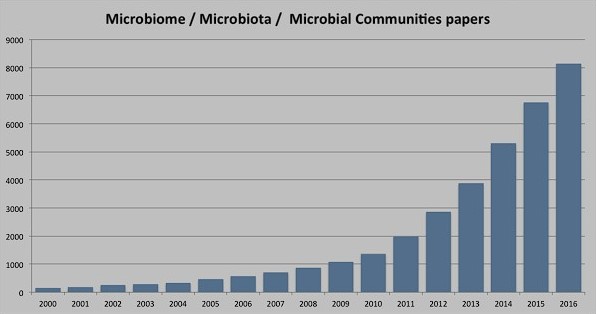Research & Guides on the Human Microbiome and Gut Health
Understanding the influence of the gut microbiome on our well-being, and of the environment on our microbiome.
Detailing all the ways our microbiomes impact our health, function, and development. Providing answers on how we can maintain or achieve a healthy, eubiotic microbiome, and how to prevent and correct dysbiosis.
For feedback, edits, contributions, suggestions, etc., feel free to make a post on the forum.
If you're curious about a condition not listed here, do a web, pubmed, or google scholar search for "condition microbiome" or "condition dysbiosis".
Research in the area of the microbiome is growing rapidly in recent years due to advances in detection/sequencing techniques:

(image from microbiomedigest.com)
This means that many long standing positions are being debunked, and even much of what you read (here or elsewhere) can become quickly outdated.
See the Testing page for examples of current status/limitations of detecting & identifying human microbes.
On this page:
Notable pages:
- Intro page.
- Probiotic guide.
- Fecal Microbiota Transplants (FMT) -- FMT questionnaire.
- FAQ.
- Antibiotics
- Maternity
General:
Researcher Elisabeth Bik's list of other sources of microbiome info: https://microbiomedigest.com/microbiome-papers-collection/microbiome-blogs-tweeps-and-books/
Some of 2016's most discussed research papers: https://microbiomedigest.com/2016/12/21/vote-for-the-best-microbiome-papers-of-2016/
Same for 2017: https://microbiomedigest.com/2017/12/26/vote-for-the-best-microbiome-papers-of-2017/ - https://microbiomedigest.com/2018/01/02/the-best-microbiome-papers-of-2017/
Use PubPeer's browser addon to see peer discussions of academic publications: https://pubpeer.com/static/faq#29
Blog: Understanding Microbiome Research: https://microbiomethod.blogspot.co.uk/
Things that can harm our microbiome:
Acid suppression medicines [1][2][2].
Advanced glycation end products (AGEs) [1].
Air Pollution [1][2][3][4][6].
Alcohol:
- Generally [1]. Aug 2019 systematic review and meta-analysis.
- Chronic vapour alcohol exposure [1].
- Acute-on-chronic alcohol [1].
- Detrimental to mouth microbiome [1].
- Alcohol induced alterations of the microbiome may explain reward-seeking behaviors as well as anxiety, depression, and craving in withdrawal and increase the risk of developing psychiatric disorders [1].
- Increases susceptibility to pneumococcal pneumonia in a humanized murine HIV model mediated by intestinal dysbiosis [1].
Artificial sweeteners [1][2][3].
Cadmium [1].
Cocaine [1].
Dirt [1].
- Emulsifiers [1][2][3][4][5][6][7][8].
- Soy lecithin [1].
- Sulfites [1].
- Glycerol Monolaurate [1].
- Trehalose (sugar additive) [1].
- Carrageenan and carboxymethylcellulose (CMC) [1][2][3].
- CMC and polysorbate 80 (P80) [1][2][3].
- Titanium dioxide [1].
Hygiene Hypothesis [1][2][3][4][5][5]. The more accurate alternative hypothesis is Missing Microbes.
Insecticides: aldicarb [1].
Mercury: Acute oral methylmercury, Jan 2020, rats.
PCBs [1].
PFOS (Perfluorooctane sulfonate): Jan 2020, mice.
Pesticides:
- Organophosphates [1][2][3].
- Glyphosate [1][2,3].
- Subchronic low-dose 2,4-D.
- Penconazole and its enantiomers.
Plastic:
Poor diet (which compounds over generations) [1][2][3].
Stress [1].
Tobacco: Smoking dokha [1].
Trans fats [1].
Tributyltin (TBT) [1].
Antimicrobial peptides:
Peptides are created by gut bacteria, as well as by eukaryotic hosts during symbiotic interactions with bacteria.
AMPs are involved in aging: https://humanmicrobiome.info/aging#peptides
Antimicrobial Peptides Vs. Antibiotics: http://biorxiv.org/content/early/2017/05/23/138107
Spider peptides battle superbugs and cancer - Gomesin, an antimicrobial peptide (AMP) from a spider, can function as an antibiotic, and it also has anticancer activity. Australian scientists synthesized new versions that were 10 times better at killing most bacteria than previously reported: https://www.acs.org/content/acs/en/pressroom/presspacs/2017/acs-presspac-august-9-2017/spider-peptides-battle-superbugs-and-cancer.html
Review, 2018: Role of antimicrobial peptides in controlling symbiotic bacterial populations: https://pubs.rsc.org/en/Content/ArticleLanding/2018/NP/C7NP00056A#!divAbstract
Diet:
Moved to: https://humanmicrobiome.info/diet
Fungi:
Contribution of fungal microbiome to intestinal physiology, early-life immune development and mucosal inflammation in mice (Oct 2019) https://www.biorxiv.org/content/10.1101/819979v1.abstract "Our results demonstrate a dominant ecological and physiological role of bacteria in gut microbiomes, but highlight fungi as an ecological factor shaping the assembly of the bacterial community and a direct capacity to impact immune system and modulate disease susceptibility"
More at:
- https://forum.humanmicrobiome.info/forums/microbiome-studies-articles/?prefix_id=7
- https://web.archive.org/web/20230722183020/https://old.reddit.com/r/humanmicrobiome/search?q=flair%3A%27Fungi%27&sort=new&restrict_sr=on
Candida:
Moved to: https://humanmicrobiome.info/candida
Testing:
Moved to: https://humanmicrobiome.info/testing
Viruses:
Review, 2026: Gut virome plays an extended role with bacteriome in neurological health and disease https://www.jns-journal.com/article/S0022-510X(26)00035-3/abstract
The Intestinal Virome and Immunity (2018): https://doi.org/10.4049/jimmunol.1800631
Bacteriophages (phages):
Review, 2018: Beyond Bacteria: Bacteriophage-Eukaryotic Host Interactions Reveal Emerging Paradigms of Health and Disease https://www.frontiersin.org/articles/10.3389/fmicb.2018.01394/full - "Phages may be naturally internalized into eukaryotic cells. As phages are significant reservoirs of genetic diversity and considering phages are capable of entering eukaryotic cells, this raises questions about the possibility of bidirectional trans-kingdom gene exchange between phages and their animal hosts."
Potential for harm: Review, 2018: Bacteriophages as New Human Viral Pathogens: https://www.ncbi.nlm.nih.gov/pmc/articles/PMC6027513/ "We suggest that bacterial viruses have different ways to directly and indirectly interact with eukaryotic cells and proteins, leading to human diseases"
Review, June 2019: What is (not) known about the dynamics of the human gut virome in health and disease https://www.sciencedirect.com/science/article/pii/S1879625719300173
Review, June 2019: Phage Therapy in the Twenty-First Century: Facing the Decline of The Antibiotic Era; Is it Finally Time for The Age of the Phage? https://www.annualreviews.org/doi/10.1146/annurev-micro-090817-062535
Healthy human gut phageome identified (2016), (2019 comparison with IBD patients).
Review, 2017: Phages in the Human Body: http://journal.frontiersin.org/article/10.3389/fmicb.2017.00566/full
Review, 2017: Bacteriophages in the human gut: our fellow travelers throughout life and potential biomarkers of heath or disease. Phages are the largest part of the human microbiome: http://www.sciencedirect.com/science/article/pii/S0168170217302149
Review, 2017: The human intestinal virome in health and disease: http://onlinelibrary.wiley.com/doi/10.1111/apt.14280/full
Review, 2017: Bacteriophages in the gastrointestinal tract and their implications: https://www.ncbi.nlm.nih.gov/pmc/articles/PMC5553654/
Source of phages doesn't seem to matter. Phages obtained from sewer have beneficial effects.
Addressing superbug resistance with phage therapy. "The study is significant because it is the first time bacteriophage therapy has been used in the USA to treat a patient who had an antibiotic-resistant, blood stream infection." (Aug 2017) https://medicalxpress.com/news/2017-08-superbug-resistance-phage-therapy.html
Great article on the current (Nov 2017) status in the US of the use of phages for fighting an infectious disease: http://www.cidrap.umn.edu/news-perspective/2017/11/save-life-doctors-turn-bacteria-killing-viruses | Another from Nov 2017 about a separate occurrence: https://www.statnews.com/2017/11/28/phage-therapy-mallory-smith/ | Another from Dec 2017: https://motherboard.vice.com/en_us/article/9kdbqa/bacteriophages-phage-therapy-antibiotic-resistant-bacteria (the video on the page has even more).
Phages are an important component of FMT success [2016].
Transferring just the bacteriophage was sufficient to reduce resting metabolic rate and cause weight gain in control mice (2015): https://www.sciencedaily.com/releases/2015/12/151214130811.htm
The Virus That Could Cure Alzheimer’s, Parkinson’s, and More: http://www.pbs.org/wgbh/nova/next/body/phage-alzheimers-cure/
Phage therapy via clinics ($1k-4k) or supplements ($30-200) - link.
Phage supplements in the US: https://archive.fo/hF4y8#selection-789.0-789.1
More info on phages:
- https://web.archive.org/web/20230722182843/https://old.reddit.com/r/humanmicrobiome/search?q=flair%3A%27Phages%27&sort=new&restrict_sr=on
- https://forum.humanmicrobiome.info/forums/microbiome-studies-articles/?prefix_id=24
Last updated 2026-01-17.